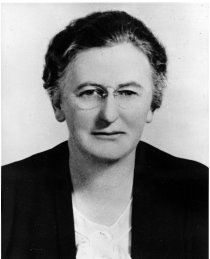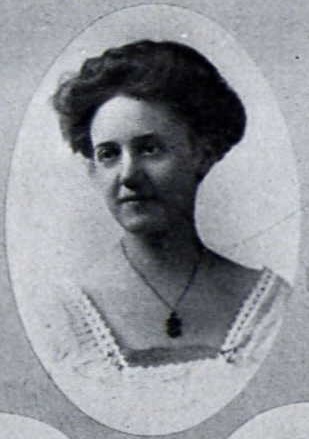Related Research Articles

Mary Williams Dewson (1874–1962) was an American feminist and political activist. After graduating from Wellesley College in 1897, she worked for the Women's Educational and Industrial Union. She became an active member of the National Consumers League (NCL) and received mentorship from Florence Kelley, a famous advocate for social justice feminism and General Secretary of the NCL. Dewson's later role as civic secretary of the Women's City Club of New York (WCCNY) led to her meeting Eleanor Roosevelt, who later convinced Dewson to be more politically active in the Democratic Party. Dewson went on to take over Roosevelt's role as head of the Women's Division of the Democratic National Campaign Committee. Dewson's "Reporter Plan" mobilized thousands of women to spread information about the New Deal legislation and garner support for it. In connection with the Reporter Plan, the Women's Division held regional conferences for women. This movement led to a historically high level of female political participation.
The history of feminism comprises the narratives of the movements and ideologies which have aimed at equal rights for women. While feminists around the world have differed in causes, goals, and intentions depending on time, culture, and country, most Western feminist historians assert that all movements that work to obtain women's rights should be considered feminist movements, even when they did not apply the term to themselves. Some other historians limit the term "feminist" to the modern feminist movement and its progeny, and use the label "protofeminist" to describe earlier movements.
Susan Griffin is a radical feminist philosopher, essayist and playwright particularly known for her innovative, hybrid-form ecofeminist works.

Mary Ritter Beard was an American historian, author, women's suffrage activist, and women's history archivist who was also a lifelong advocate of social justice. As a Progressive Era reformer, Beard was active in both the labor and women's rights movements. She also authored several books on women's role in history including On Understanding Women (1931), America Through Women's Eyes, and Woman as Force in History: A Study in Traditions and Realities (1946), her major work. In addition, she collaborated with her husband, historian Charles Austin Beard, as coauthor of seven textbooks, most notably The Rise of American Civilization (1927), two volumes, and America in Midpassage: A Study of the Idea of Civilization (1939) and The American Spirit (1942), the third and fourth volume of The Rise of American Civilization series. A standalone book, Basic History of the United States, was their best-selling work.

The Arthur and Elizabeth Schlesinger Library on the History of Women in America is a research library at the Radcliffe Institute for Advanced Study, Harvard University. According to Nancy F. Cott, the Carl and Lily Pforzheimer Foundation Director, it is "the largest and most significant repository of documents covering women's lives and activities in the United States".
Grace Atkinson, better known as Ti-Grace Atkinson, is an American radical feminist activist, writer and philosopher.

Veteran Feminists of America (VFA) is a 501(c)(3) charitable organization for supporters and veterans of the second-wave feminist movement. Founded by Jacqueline Ceballos in 1992, Veteran Feminists of America regularly hosts reunions for second-wave feminists and events honoring feminist leaders.

Charlotte Murray Curtis was an American journalist, columnist and editor at The New York Times.
Eleanor Flexner was an American distinguished independent scholar and pioneer in what was to become the field of women's studies. Her much praised Century of Struggle: The Woman's Rights Movement in the United States, originally published in 1959, relates women's physically courageous and politically ingenious work for the vote to other 19th- and early 20th-century social, labor, and reform movements, most importantly the push for equal education, the abolition of slavery, and temperance laws.
Social feminism is a feminist movement that advocates for social rights and special accommodations for women. It was first used to describe members of the women's suffrage movement in the late nineteenth and early twentieth centuries who were concerned with social problems that affected women and children. They saw obtaining the vote mainly as a means to achieve their reform goals rather than a primary goal in itself. After women gained the right to vote, social feminism continued in the form of labor feminists who advocated for protectionist legislation and special benefits for women. The term is widely used, although some historians have questioned its validity.
Rosalind Rosenberg is an American historian.
Jane Kamensky, an American historian, is a professor of history at Harvard University. She is also the Carl and Lily Pforzheimer Foundation Director of the Schlesinger Library.
Joan Kelly, also known as Joan Kelly-Gadol was a prominent American historian who wrote on the Italian Renaissance, specifically on Leon Battista Alberti. Among her best known works is the essay "Did Women Have a Renaissance?" which was first published in 1976. The article challenged the contemporary historiography of the Renaissance, arguing that women's power and agency declined during the early modern period.

Catherine Shipe East was a U.S. government researcher and feminist referred to as "the midwife to the women's movement". She was a powerful force behind the founding of the National Organization for Women (NOW) and held several influential federal government positions throughout her career.
Dorothy Dunbar Bromley was an American journalist and early writer on birth control and women's issues.
Nancy Falik Cott is an American historian and professor who has taught at Yale and Harvard universities, specializing in gender topics in the United States in the 19th and 20th centuries. She has testified on same-sex marriage in several US states.

Elizabeth Bancroft Schlesinger was an American suffragist, civic leader, feminist, and pioneer in the field of women's history.
Rosalyn Baxandall was an American historian of women's activism and feminist activist.

Mary G. "Polly" Porter was a social worker and for more than 50 years the partner of Mary Dewson, feminist and political activist. Porter was a close friend of Eleanor Roosevelt and part of her tight-knit circle of female friends.

Clara Mortenson Beyer was a pioneer in labor economics and workers rights. She worked under Frances Perkins at the United States Department of Labor during the New Deal era, and was instrumental in implementing minimum wage legislation via the Fair Labor Standards Act of 1938.
References
- ↑ Lee, A.C. (February 21, 2013). "Symposium on 'Feminine Mystique,' and More". The New York Times. Retrieved May 24, 2014.
- ↑ Lambert, Bruce (August 23, 1992). "Barbara Solomon, 73, Educator and Pioneer in Women's Studies". The New York Times. Retrieved January 12, 2017.
- ↑ Ware, Susan (2014). "Susan Ware: My Life in the Archives". No. Spring. Schlesinger Library Newsletter. Retrieved January 12, 2017.
- ↑ "Resourceful Women: Researching and Interpreting Women's History". The Library of Congress. Retrieved May 28, 2014.
- ↑ "Susan Ware Appointed Senior Advisor to the Schlesinger Library at the Radcliffe Institute for Advanced Study" . Retrieved October 15, 2014.
- ↑ "Historian Jane Kamensky Joins Radcliffe Institute And HarvardHistory Department". Radcliffe Institute. Retrieved December 14, 2016.
- ↑ Geissinger, Mike (November 13, 1987). "Washington Talk: Women in Government; Tales of the Pioneers". The New York Times. Retrieved May 24, 2014.
- ↑ Cott, Nancy (Summer 1982). "Review of "Beyond Suffrage: Women in the New Deal"". Signs. 7 (4): 897–900. doi:10.1086/493931.
- ↑ Freeman, Jo (March 1989). "Review, "Partner and I: Molly Dewson, Feminism and New Deal Politics"". The American Political Science Review. 83 (1): 273.
- ↑ Ware, Susan (2019). Why They Marched: Untold Stories of the Women Who Fought for the Right to Vote. Cambridge, Mass.: Harvard University Press.